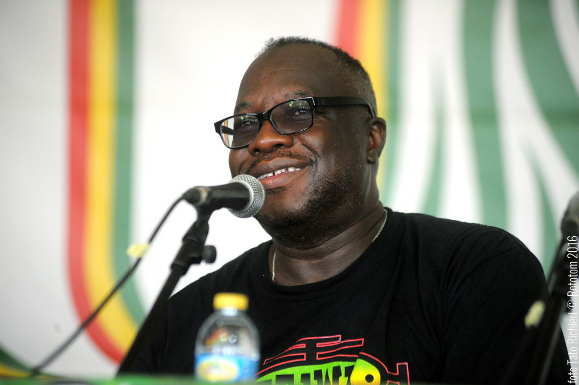Articles about reggae music, reviews, interviews, reports and more...
Mad Professor dubs up the Reggae University

Mad Professor dubs up the Reggae University
The dub master gave a fascinating talk on the four-decade journey of his Ariwa label. He described how he became interested in electronics, what it was like working with Lee Scratch Perry and how his musical palette is broader than many think…
There had been much talk of vocals and lyrics at the Rototom Reggae University 2016 thus far. That all changed on the fifth day when UK producer, remixer and electronics pioneer Neil Fraser, the Mad Professor, flipped the conversation to the art and science of dub. The session was chaired by author and regular panellist, David Katz, who has known Mr Fraser for years. A select gathering heard Prof tell of how he became interested in electronics as a small child in British Guyana (“not your typical South American country… to all intents and purposes we were African”). His mother scolded him when he screwed the back off their radio to “see where the talking man lived”. By age eight he had assembled his own radio and by his teens; when he moved to London to live with his father, he was building mixing consoles. The distinctive sound of his label, Ariwa came from “the desk I built with home-made components and EQ-ed a certain way to comfort my strange ears”.
To the chagrin of his mother-in-law, he constructed a studio in the biggest room of his house in Thornton Heath, South East London. He recorded local bands of all genres and gradually began to attract UK reggae acts like Matumbi and visiting Jamaican singers such as Johnny Clarke. “Back then everyone wanted to sound like the dominant Jamaican studio, Channel One. No one had faith in the English sound. We started with yard guys so we were more accepted and had a tough rebellious sound.”

At the same time, he was also an encourager of female artists and the burgeoning lovers rock scene. “Lovers rock wasn’t understood by roots fans. Only when you get a Waiting In Vain or No Woman No Cry do they understand even a freedom fighter needs time to love. I always loved soul. On my iPod you hear rebellious and sweet songs. I like to make lovers with a rebellious edge.”
One of his proudest moments was recording his hero, the deejay U Roy, after meeting him on tour in the USA (where he also met and collaborated with the Beastie Boys). U Roy was sceptical at first but agreed to cut True Born African with the UK singer Sister Audrey.
Co-panellist Ellen Koehlings from Riddim mag asked about the rise of interest in dub through the new reggae movement in Jamaica. Fraser answered that he is in regular contact with Jah9, Protoje and Chronixx. He added that “the interest comes from the university educated middle class. The ghetto market in Jamaica is no more dub aware than 15 years ago. In the old days dub was ghetto. Dances in Tooting and Wandsworth were so heavy that ordinary black people wouldn’t go, let alone white people”.
He had some choice words for that other reggae eccentric, Lee Scratch Perry, with whom he has join forces numerous times. “Some say he’s a genius, some say he’s rubbish, but there’s definitely something special there. It could be obeah – it could be talent!”
The title of the session may have been My Computer’s Acting Strange (named after his 1986 album) but the Professor is not a fan of computers as production tools. “With a computer you are only one man” he said “No matter how talented you are you need an exchange of ideas with musicians”.
Read more about this topic
Comments actually desactivated due to too much spams
Browse by categories
Recommended Articles
Latest articles
Recently addedView all
© 2007-2026 United Reggae. All Rights Reserved. Reproduction in whole or in part is prohibited. Read about copyright
Terms of use | About us | Contact us | Authors | Newsletter | A-Z














